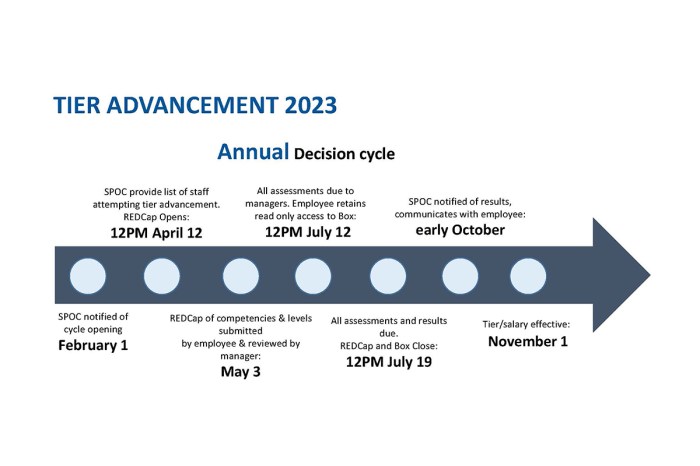For each advancement cycle education service officers should retain sets the stage for this enthralling narrative, offering readers a glimpse into a story that is rich in detail and brimming with originality from the outset. This insightful discourse delves into the critical significance of retaining experienced and skilled education service officers within educational institutions, shedding light on their invaluable contributions to continuous improvement and overall effectiveness.
Prepare to embark on an intellectual journey that unravels the strategies, impact, challenges, and comprehensive plans associated with retaining these indispensable professionals.
As we delve deeper into this topic, we will explore the multifaceted role of education service officers, examining how their knowledge and expertise contribute to fostering a positive and supportive learning environment. We will uncover the correlation between retaining these officers and improved student performance, highlighting the ways in which they effectively identify and address student needs.
Furthermore, we will investigate the common challenges faced by educational institutions in retaining education service officers, exploring innovative approaches to address these challenges and improve job satisfaction.
Understanding the Significance of Retaining Education Service Officers for Each Advancement Cycle: For Each Advancement Cycle Education Service Officers Should Retain

Retaining experienced and skilled education service officers is paramount for continuous improvement in education services. Their knowledge, expertise, and dedication contribute significantly to the overall effectiveness of educational institutions.
Experienced education service officers possess a deep understanding of educational policies, curricula, and best practices. They play a pivotal role in developing and implementing innovative teaching methodologies, ensuring that students receive high-quality instruction.
Moreover, they provide invaluable support to teachers and administrators, fostering a collaborative and supportive learning environment. By retaining experienced education service officers, institutions can ensure continuity in educational programs and services, benefiting both students and the broader educational community.
Strategies for Retaining Education Service Officers
Attracting and retaining high-quality education service officers requires a comprehensive approach that addresses their professional needs and aspirations.
- Competitive Compensation and Benefits Packages:Offering competitive salaries, health insurance, and retirement plans is essential to attract and retain experienced professionals.
- Professional Development Opportunities:Providing opportunities for professional growth, such as workshops, conferences, and advanced degree programs, demonstrates an institution’s commitment to the professional development of its staff.
- Career Advancement Pathways:Creating clear career advancement pathways with opportunities for promotion and leadership roles motivates education service officers to stay within the organization.
Additionally, fostering a positive and supportive work environment that values diversity, equity, and inclusion is crucial for retaining a diverse and dedicated workforce.
The Impact of Retaining Education Service Officers on Student Outcomes
Research has consistently shown a strong correlation between retaining experienced education service officers and improved student performance.
- Positive Learning Environment:Experienced education service officers create a positive and supportive learning environment that fosters student engagement and motivation.
- Effective Identification and Support:They are skilled at identifying and addressing student needs, providing timely and targeted support to ensure academic success.
- Improved Teacher Performance:Experienced education service officers provide mentorship and support to teachers, helping them improve their instructional practices and enhance student learning.
By retaining experienced education service officers, institutions can create a stable and effective learning environment that promotes student success.
Overcoming Challenges in Retaining Education Service Officers, For each advancement cycle education service officers should retain
Retaining education service officers can be challenging due to factors such as workload, stress, and burnout.
- Workload Management:Implementing strategies to manage workload, such as workload analysis and task delegation, can reduce stress and improve job satisfaction.
- Stress Reduction Techniques:Offering stress reduction programs, such as mindfulness training and yoga classes, can help education service officers cope with the demands of their work.
- Burnout Prevention:Encouraging regular breaks, vacations, and opportunities for self-care can prevent burnout and promote overall well-being.
By addressing these challenges, institutions can create a supportive and engaging work environment that fosters retention.
Designing a Comprehensive Retention Plan
Developing a comprehensive retention plan is crucial for effectively retaining education service officers.
- Stakeholder Involvement:Involving stakeholders, including education service officers, in the planning process ensures that the plan addresses their needs and concerns.
- Data and Feedback:Using data and feedback to monitor and evaluate the effectiveness of retention strategies is essential for making informed decisions and improving the plan.
- Customized Plan:Creating a customized retention plan tailored to the specific needs of the institution ensures that the plan is relevant and effective.
By following these principles, educational institutions can design and implement comprehensive retention plans that promote the retention of experienced and skilled education service officers.
Frequently Asked Questions
What are the key elements of a comprehensive retention plan for education service officers?
A comprehensive retention plan for education service officers should include a clear understanding of the institution’s goals, an analysis of the factors that contribute to retention, the development of targeted strategies to address those factors, and a system for monitoring and evaluating the effectiveness of the plan.
How can educational institutions overcome the challenges in retaining education service officers?
Educational institutions can overcome the challenges in retaining education service officers by addressing factors such as workload, stress, and burnout, providing professional development opportunities and career advancement pathways, and creating a supportive and engaging work environment.
What is the impact of retaining education service officers on student outcomes?
Retaining education service officers has a positive impact on student outcomes by creating a stable and supportive learning environment, providing students with access to experienced and knowledgeable professionals, and ensuring the continuity of high-quality education services.


